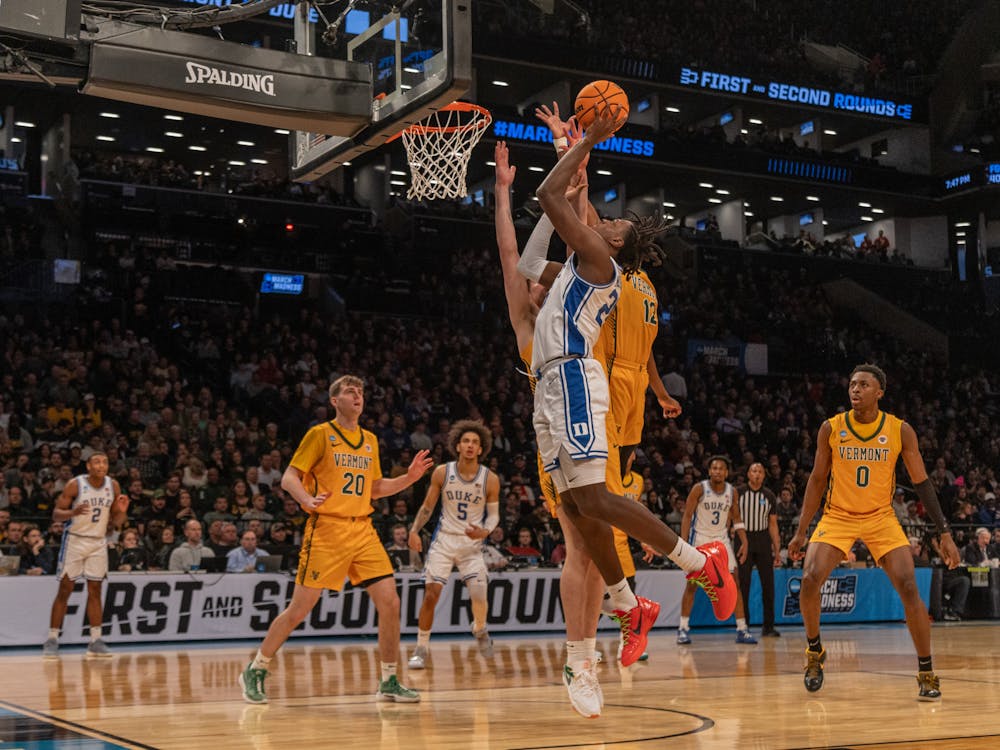After each Duke men's basketball game this season, check back here for the Player of the Game and more. The Blue Devils opened their NCAA tournament run with a 64-47 victory against Vermont, and the Blue Zone analyzes the contest:
One player: Mark Mitchell
Mark Mitchell has been something of an X-Factor for the Blue Devils. His performances are rather inconsistent — he boasts a high ceiling of efficient scoring and 1-through-5 defense, but is balanced with a low floor due to his underdeveloped shot-creation ability. In this way, the Kansas City, Kan., native often serves as a litmus test for the team’s ball movement. When the guards are drawing pressure to the perimeter and sophomore center Kyle Filipowski is a threat in the post, Mitchell often finds openings to receive a pass and get to the rim in just one dribble. It is in these sorts of games where he is able to thrive.
This was exactly the case in Duke’s tournament opener against Vermont. Mitchell scored 15 points while grabbing five rebounds, a block and a steal enroute to a +11 plus-minus on the floor. His efficient scoring was found on a 6-of-9 performance from the field, including four dunks in the first half. Beyond the box score, Mitchell was situationally important in getting the Blue Devils going early. What many expected to be a standout performance for Filipowski was foiled when the Catamounts turned to a double team whenever he started dribbling. This forced Mitchell to be the piece that took advantage of their lack of size, scoring 11 of Duke’s first 26 — all earned in the paint. Capitalizing on these opportunities kept momentum from swaying too far in Vermont’s favor, despite electric first-half shotmaking from guards Aaron Deloney and Shamir Bogues.
One word: Survive
It wasn’t pretty. The Blue Devils’ opening contest of the tournament was filled with atypical lineups, turnovers and missed open looks. Tough makes on Vermont’s end saw Duke up just five heading into halftime. The team shot a weak 33.3% on deep-balls — numbers that are overall discouraging for a team that markets itself as a shooting threat. All-American Filipowski took just one field-goal attempt.
Yet, the Blue Devils still found a way to win, and by a convincing margin of 17. This year’s NCAA tournament is already riddled with first-round upsets including No. 3-seed Kentucky, No. 4-seed Auburn and No. 5-seed Wisconsin. No. 4-seed Kansas just barely escaped elimination at the hands of No. 13-seed Samford. Evaluating Duke’s performance needs to hold this context in mind. There is no win to take for granted.
The Blue Devils demonstrated a strong grittiness when faced with a potential Cinderella. Their shots weren’t falling, so the defensive effort intensified and the Catamounts were held to a mere 38.5% clip from the floor. Vermont’s defensive approach was heavily centered around locking down scoring from Filipowski. Instead of trying to push back, he found other ways to contribute and finished with twelve rebounds, four assists and five combined steals and blocks. As it looks towards the second round, Duke needs to maintain this mentality of playing to survive and advance, with in-game adjustments and consistent intensity at the forefront of its performances.
One stat: Duke four bench points
The season-ending injury of freshman guard Caleb Foster gave a big hit to the depth of this year’s rotation for the tournament. Missing their go-to sixth man, the Blue Devils now lack a primary scoring and ball-handling option off the bench. Head coach Jon Scheyer opted to distribute some of Foster’s minutes to junior Jaylen Blakes. The defensive-minded guard gives the squad a much needed anchor when the primary on-ball defenders like Jeremy Roach and Jared McCain run into foul trouble or simply need some rest. Blakes, however, lacks the offensive ceiling of Foster, scoring just one field goal on a fast break in his nine minutes on the floor against Vermont.
Scheyer hardly dipped into the bench at all outside of Blakes. The remainder of the roster saw only a collective 10 minutes on the floor. While this reliance on the starting five proved unproblematic in the opening round, it is certainly still a weak point for a team looking to make a deep tournament run. Teams that play at a faster pace will wear this rotation out and force it into relying on depth that simply isn’t there. Likewise, teams that have a dominant paint presence and consistently attack the rim could put the starters into foul trouble. At those points, Scheyer may have to dip into players like Blakes, Ryan Young, Sean Stewart and TJ Power; they all have the potential to be impactful players, but lack demonstrated consistency in high-stakes environments.
Get The Chronicle straight to your inbox
Sign up for our weekly newsletter. Cancel at any time.

